【2015中考复习方案】(人教版·包头)2015届九年级英语复习课件(自学反馈+重点突破):第2课时 Units 5—9[七年级上册](共42张PPT)
文档属性
| 名称 | 【2015中考复习方案】(人教版·包头)2015届九年级英语复习课件(自学反馈+重点突破):第2课时 Units 5—9[七年级上册](共42张PPT) | 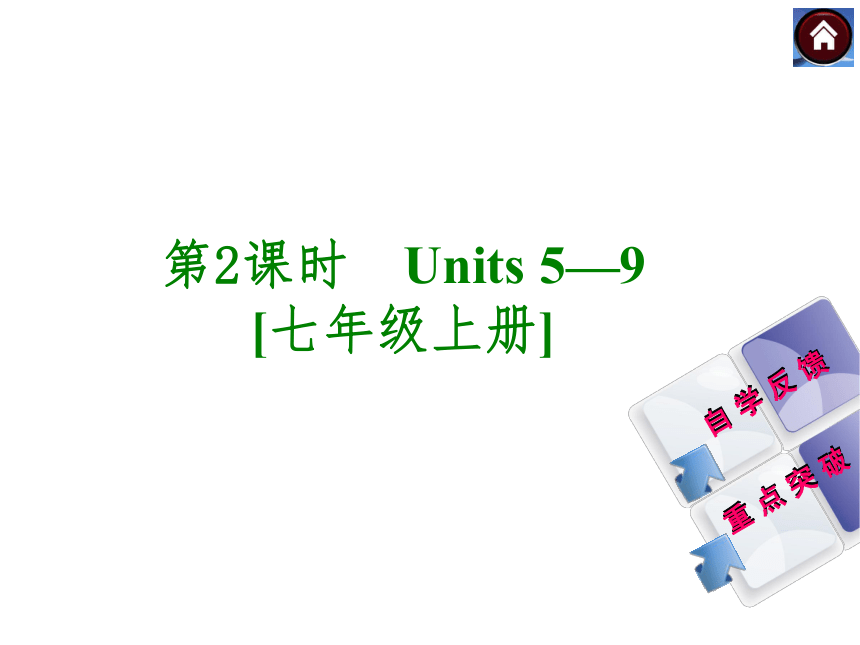 | |
| 格式 | zip | ||
| 文件大小 | 349.8KB | ||
| 资源类型 | 教案 | ||
| 版本资源 | 通用版 | ||
| 科目 | 英语 | ||
| 更新时间 | 2015-01-17 14:09:57 | ||
图片预览

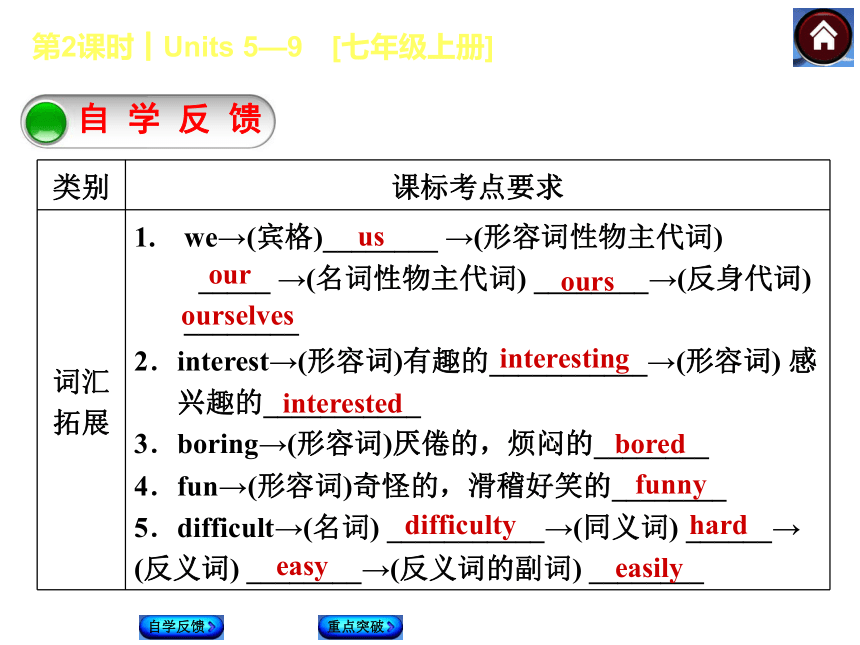
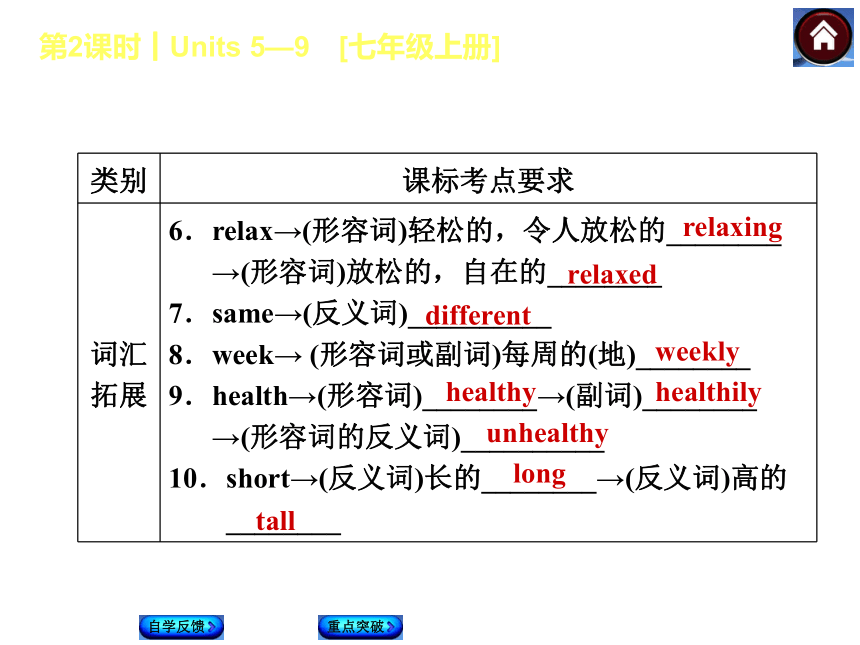
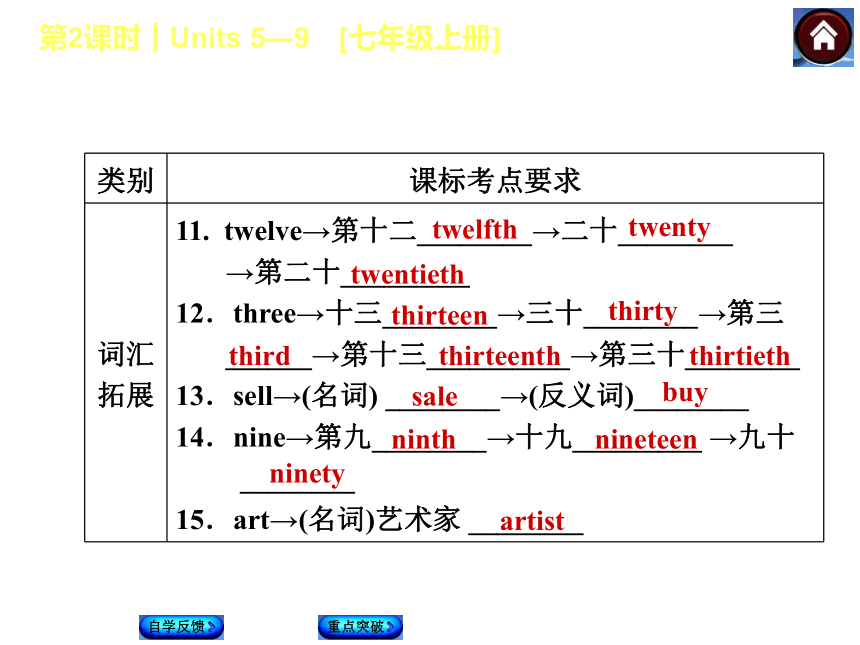
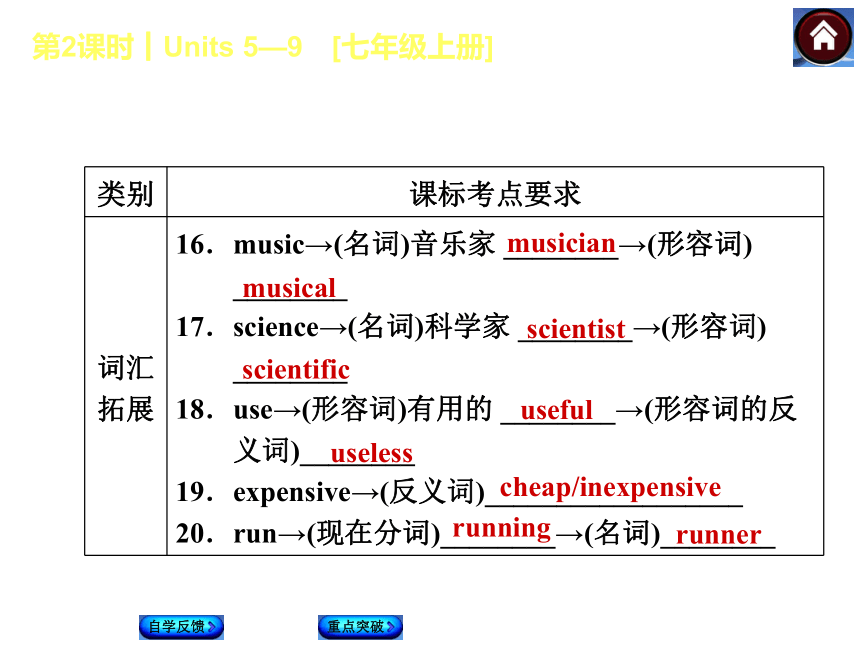
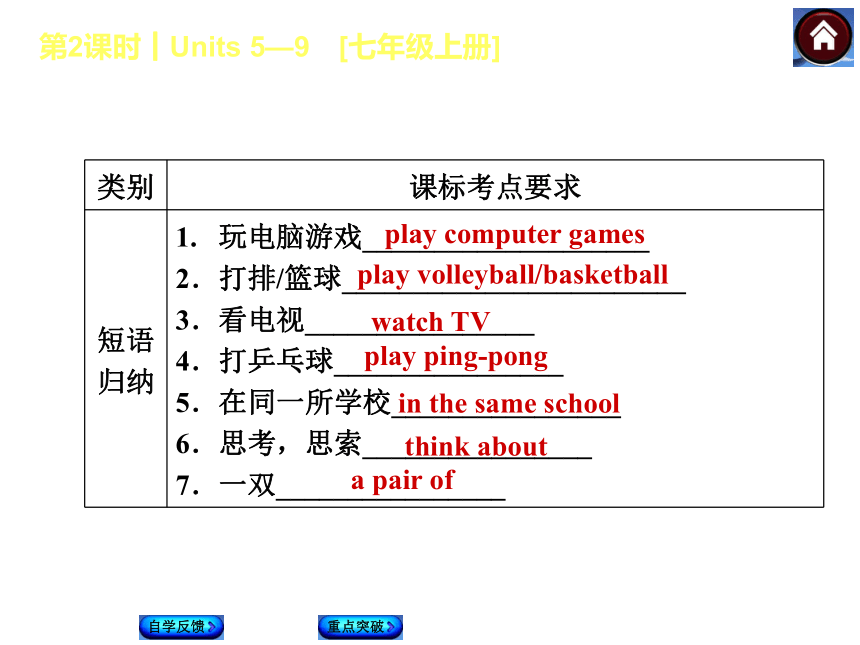
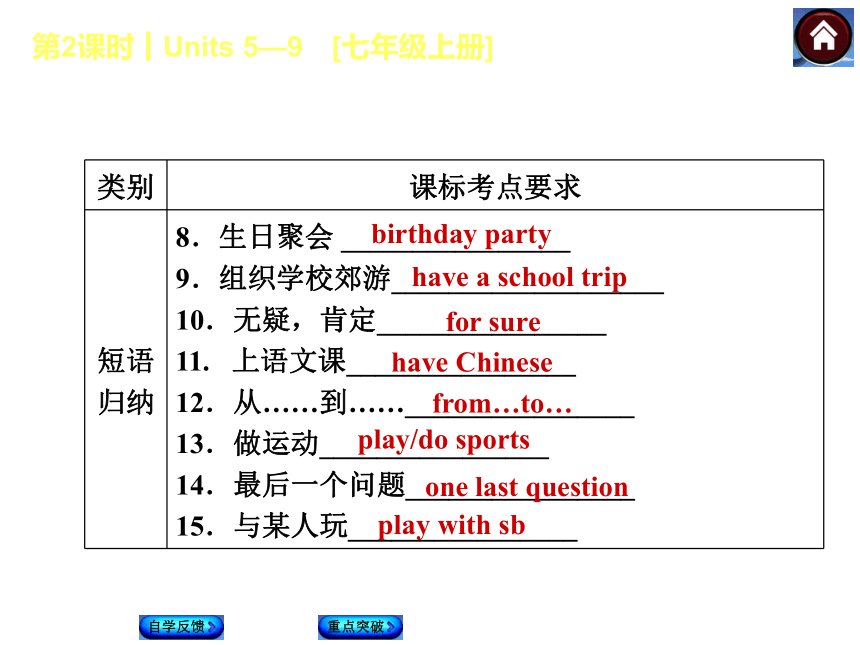
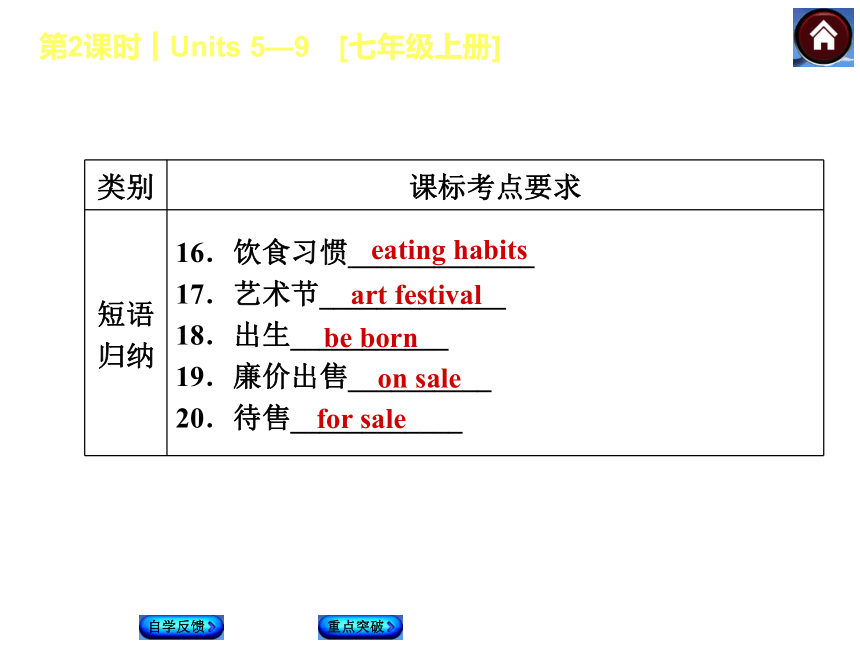
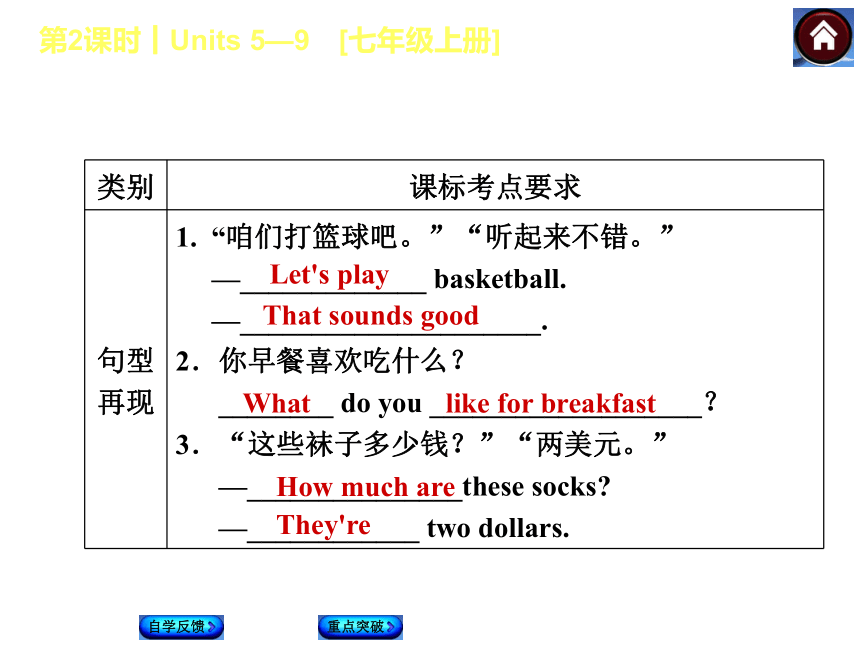
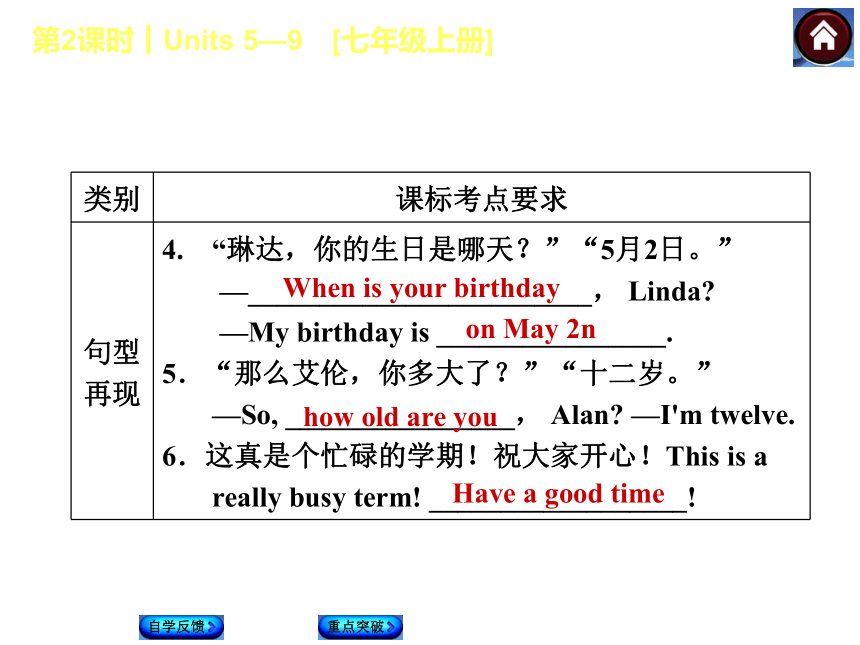
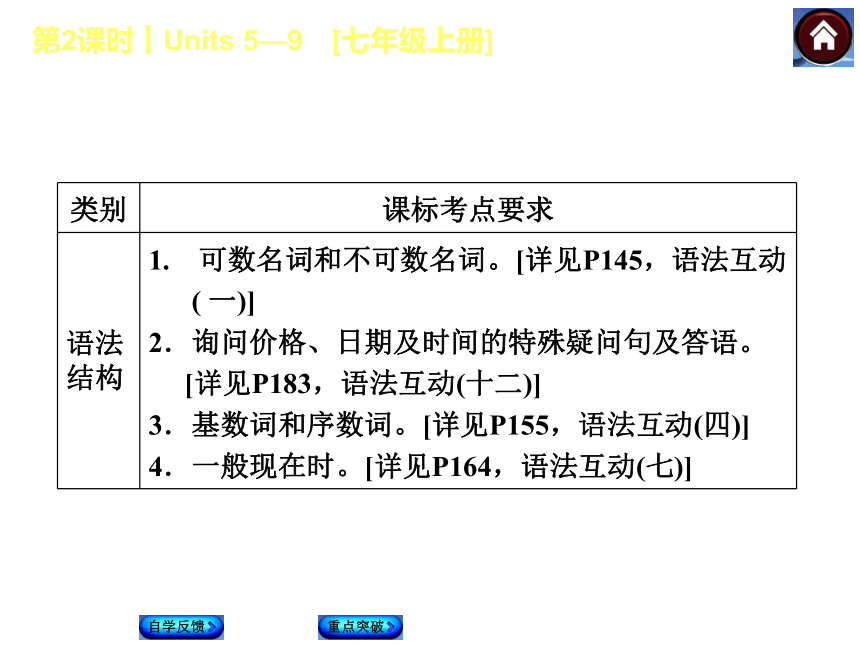
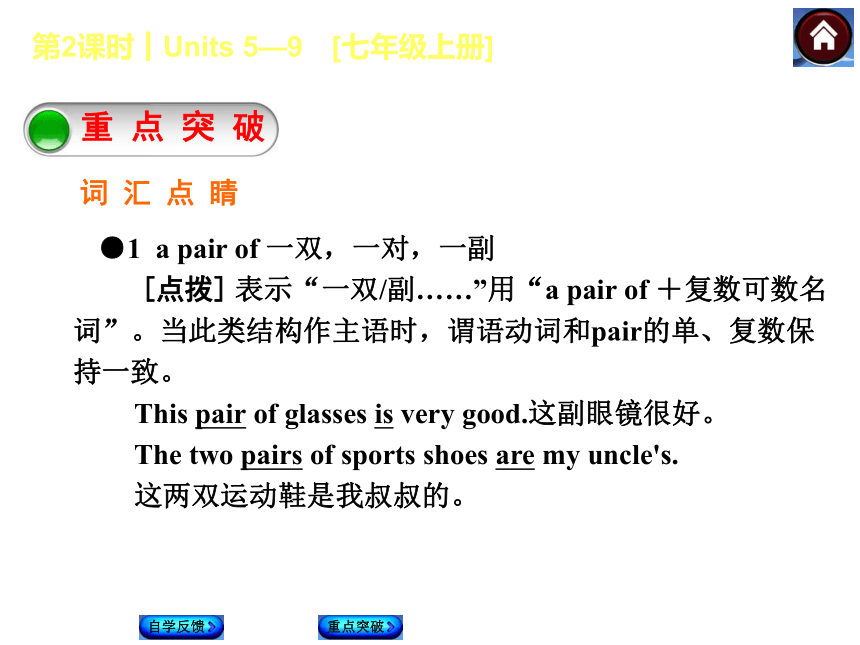
文档简介
课件42张PPT。第2课时 Units 5—9
[七年级上册] 第2课时┃Units 5—9 [七年级上册]us our bored ourselves interesting interested ours funny difficulty hard easy easily 第2课时┃Units 5—9 [七年级上册]relaxing relaxed different weekly healthy healthily unhealthy long tall第2课时┃Units 5—9 [七年级上册]twelfth twenty twentieth thirteen thirty third thirteenth thirtieth sale buy ninth nineteen ninety artist 第2课时┃Units 5—9 [七年级上册]musician musical scientist scientific useful useless cheap/inexpensive running runner 第2课时┃Units 5—9 [七年级上册]play computer games play volleyball/basketball watch TV play ping-pong in the same school think about a pair of 第2课时┃Units 5—9 [七年级上册]birthday party have a school trip for sure have Chinese from…to… play/do sports one last question play with sb 第2课时┃Units 5—9 [七年级上册]eating habits art festival be born on sale for sale 第2课时┃Units 5—9 [七年级上册]Let's play That sounds good Whatlike for breakfast How much are They're 第2课时┃Units 5—9 [七年级上册]When is your birthday on May 2nhow old are you Have a good time 第2课时┃Units 5—9 [七年级上册]●1 a pair of 一双,一对,一副
[点拨] 表示“一双/副……”用“a pair of +复数可数名词”。当此类结构作主语时,谓语动词和pair的单、复数保持一致。
This pair of glasses is very good.这副眼镜很好。
The two pairs of sports shoes are my uncle's.
这两双运动鞋是我叔叔的。 第2课时┃Units 5—9 [七年级上册]词 汇 点 睛 ●2 buy v.购买,买
[点拨] buy sb. sth.=buy sth. for sb.
买某物给某人;buy sth. from sb.向某人买某物
My father bought me a computer.
=My father bought a computer for me.
我父亲给我买了一台电脑。
[拓展] buy的反义词为sell,sell的名词形式是sale。常用搭配:
sell sb. sth.=sell sth. to sb. 把某物卖给某人;
on sale 出售,廉价出售;
for sale出售的,待售的,上市的第2课时┃Units 5—9 [七年级上册]第2课时┃Units 5—9 [七年级上册] [2014·盐城] 父亲节快到了,我想给父亲买些礼物。
Father's Day is coming. I want to _________________
______________________________________.中考典例 buy my father somepresents/buy some presents for my father ●3 busy adj. 忙碌的;无暇的
[点拨] busy为形容词,它的反义词是free,意为“空闲的”。
常考搭配
be busy with sth. 忙于某事
be busy doing sth. 忙于做某事
Are you busy with your homework?
你正忙于做作业吗?
Mr. Smith is busy writing a letter.
史密斯先生正忙着写信。第2课时┃Units 5—9 [七年级上册]第2课时┃Units 5—9 [七年级上册][2014·乌鲁木齐] He is busy ________ at school, but he never forgets ________ his mom a phone call every day.
A.working; giving B.work; give
C.working; to give D.work; to give中考典例 C 第2课时┃Units 5—9 [七年级上册] [2014·来宾] Remember to return the book to the library
when you finish________ it.
A.read B.to read C.reading D.reads中考典例 ●4 finish v.完成,做好
[点拨] finish后常加名词或动名词。
When can you finish (doing) the work?
你何时能完成这项工作?C 第2课时┃Units 5—9 [七年级上册]●1 sound/noise/voice
巧 辨 异 同 第2课时┃Units 5—9 [七年级上册] [注意] sound还可作连系动词,意为“听起来”,后常接形容词作表语。
It sounds wonderful! 听起来妙极了!第2课时┃Units 5—9 [七年级上册][2014·白银] The boy didn't sleep well because of the ________ from the factory.
A.voice B.noise C.music D.song中考典例 B●2 look(at)/see/watch/read第2课时┃Units 5—9 [七年级上册]第2课时┃Units 5—9 [七年级上册] Look at the picture. What can you see in it?
看这幅画,你能在里面看到什么?
Would you like to watch a football match with me?
您愿意同我一起去看一场足球赛吗?
My father usually reads newspapers after supper.
我爸爸通常在晚饭后读报纸。第2课时┃Units 5—9 [七年级上册]第2课时┃Units 5—9 [七年级上册]1. 单项填空
I prefer ________ TV to ________ books.
A.watching; reading B.reading; watching
C.seeing; watching D.watching; looking典型例题 2. 根据句意,用see, look at, watch或read的适当形式填空
(1)Did you ________ the football game on TV last night?
(2)Don't ________ in the sun. It's bad for your eyes.
(3)I am ___________ the blackboard, but I can't________
the words. Awatchreadlooking atsee●3 both/all?第2课时┃Units 5—9 [七年级上册]第2课时┃Units 5—9 [七年级上册][2014·乐山] —Which of these two books will you take?
—I'll take ________. I need them to kill time on my journey.
A.either B.both C.all中考典例 B第2课时┃Units 5—9 [七年级上册]●4 because of/because
(1)because of 是介词短语,意为“因为……;由于……”,后面接名词(短语)、代词等。
(2)because 意为“因为”,是连词,后接原因状语从句。
We didn't go to the movies because of the rain.
=We didn't go to the movies because it rained.
因为下雨,所以我们没去看电影。 第2课时┃Units 5—9 [七年级上册][2014·襄阳] —Did you have a sports meeting yesterday?
—No, we didn't. It was put off ________ the heavy rain.
A.instead of B.because of
C.as for D.across from中考典例 B第2课时┃Units 5—9 [七年级上册]●5 at/in/on
(1)表示地点时:
①at 指“在……里面或附近”,后接较小的地点。如:at the bus stop, at home。
②in指“在……里面”,后接较大的地点。如:in China, in the world。
③on指“在……上”,表示在一个平面上。如:on the farm, on the blackboard。 [提示] 在表示范围时,在范围之内用in;互相接壤的两
个地方用on;不接壤的两个地方用to。
Shanghai is in the east of China.
上海在中国的东面。
Korea is on the east of China.
韩国在中国的东部。
Japan is to the east of China.
日本在中国的东部。第2课时┃Units 5—9 [七年级上册]第2课时┃Units 5—9 [七年级上册] (2)表示时间时:
①at 指在具体的时刻,如:at 10:00, at a quarter to seven。
②in指在某年、某月或某个季节,如:in 2012, in January, in autumn。
③on指在具体的某一天或某天的上午、下午、晚上,如:on Children's Day, on Saturday morning, on a rainy night。●1 Hey, Helen, let's go!嘿,海伦,咱们走吧!
Let me get it. 让我去拿它。
[点拨] “Let's…”意为“咱们……吧”。
肯定回答:OK./Sure./Certainly./Good idea./All right.等。
否定回答:Sorry, I…或No, let's…
—Let's go for a walk after supper.
咱们晚饭后去散步吧。
—Good idea. 好主意。
[拓展] let sb. do sth.表示“让某人做某事”。
Let him come in.让他进来。第2课时┃Units 5—9 [七年级上册]句 型 透 视 ●2 I don't want to be fat.我可不想变胖。
[句型] want sth.=would like sth. 想要/需要某物;
want to do sth.=would like to do sth. 想做某事;
want sb. to do sth.=would like sb. to do sth.
想要某人做某事
I want a dictionary. 我想要一本词典。
They want to play tennis.他们想要打网球。
My parents want me to study hard at school.
我的父母想要我在学校努力学习。第2课时┃Units 5—9 [七年级上册]第2课时┃Units 5—9 [七年级上册][2014·苏州] The driver wanted ________ his car near the roadside but was asked by the police not to.
A.park B.parked C.to park D.parking中考典例 C ●3 —How much is this T-shirt? 这件T恤衫多少钱?
—It's seven dollars. 7美元。
[点拨] how much 意为“多少”,在不同的语境中,有不同的含义。第2课时┃Units 5—9 [七年级上册](1)询问价格
How much +be+主语?
=What's the price of…?
=How much does/do…cost?
How much are these shoes?
=What's the price of these shoes?
=How much do these shoes cost? 这些鞋多少钱? (2)询问不可数名词的数量
[拓展] how many也是“多少”的意思,用来询问可数名词的数量。
How many apples do you want?
你想要多少苹果?第2课时┃Units 5—9 [七年级上册]第2课时┃Units 5—9 [七年级上册][2014·永州] —________ is your new schoolbag?
— It's ¥30.
A.How many B.How much C.How long中考典例 B●4 Here you are.给你。
[点拨] Here it is. 和Here you are.都译为“给你,在这儿”,但其使用场合有所区别:
(1)当所给(递)的东西是对方要求的原物时,两者可通用(Here it is.的复数形式为Here they are.)。
—May I borrow your bike? 我可以借你的自行车吗?
—Here it is.(或Here you are.)这就是。第2课时┃Units 5—9 [七年级上册]
(2)当对方所给(递)的东西不是对方要求的原物,而是替代物或同类物时,则只能用Here you are。
—I have left my pen at home.
我把我的钢笔落在家里了。
—Here you are. Use mine. 给你,用我的吧。第2课时┃Units 5—9 [七年级上册]
[拓展] 购物时,售货员说“Here you are.” 表示“给你。”;乘车到站时,司机说“Here it is.”表示“到站了。”;若是自己所说“到站了。”则用“Here you are.”;自己发现在找的东西时,常用“Here it is.”,若是别人发现,给你时,常用“Here you are.”。第2课时┃Units 5—9 [七年级上册][2014·天津] —Can I have a look at your photos,
please?
—________.
A.Sure, here you are
B.Don't mention it
C.I can't agree with you
D.I'm sorry to hear that中考典例 第2课时┃Units 5—9 [七年级上册]A第2课时┃Units 5—9 [七年级上册]
[七年级上册] 第2课时┃Units 5—9 [七年级上册]us our bored ourselves interesting interested ours funny difficulty hard easy easily 第2课时┃Units 5—9 [七年级上册]relaxing relaxed different weekly healthy healthily unhealthy long tall第2课时┃Units 5—9 [七年级上册]twelfth twenty twentieth thirteen thirty third thirteenth thirtieth sale buy ninth nineteen ninety artist 第2课时┃Units 5—9 [七年级上册]musician musical scientist scientific useful useless cheap/inexpensive running runner 第2课时┃Units 5—9 [七年级上册]play computer games play volleyball/basketball watch TV play ping-pong in the same school think about a pair of 第2课时┃Units 5—9 [七年级上册]birthday party have a school trip for sure have Chinese from…to… play/do sports one last question play with sb 第2课时┃Units 5—9 [七年级上册]eating habits art festival be born on sale for sale 第2课时┃Units 5—9 [七年级上册]Let's play That sounds good Whatlike for breakfast How much are They're 第2课时┃Units 5—9 [七年级上册]When is your birthday on May 2nhow old are you Have a good time 第2课时┃Units 5—9 [七年级上册]●1 a pair of 一双,一对,一副
[点拨] 表示“一双/副……”用“a pair of +复数可数名词”。当此类结构作主语时,谓语动词和pair的单、复数保持一致。
This pair of glasses is very good.这副眼镜很好。
The two pairs of sports shoes are my uncle's.
这两双运动鞋是我叔叔的。 第2课时┃Units 5—9 [七年级上册]词 汇 点 睛 ●2 buy v.购买,买
[点拨] buy sb. sth.=buy sth. for sb.
买某物给某人;buy sth. from sb.向某人买某物
My father bought me a computer.
=My father bought a computer for me.
我父亲给我买了一台电脑。
[拓展] buy的反义词为sell,sell的名词形式是sale。常用搭配:
sell sb. sth.=sell sth. to sb. 把某物卖给某人;
on sale 出售,廉价出售;
for sale出售的,待售的,上市的第2课时┃Units 5—9 [七年级上册]第2课时┃Units 5—9 [七年级上册] [2014·盐城] 父亲节快到了,我想给父亲买些礼物。
Father's Day is coming. I want to _________________
______________________________________.中考典例 buy my father somepresents/buy some presents for my father ●3 busy adj. 忙碌的;无暇的
[点拨] busy为形容词,它的反义词是free,意为“空闲的”。
常考搭配
be busy with sth. 忙于某事
be busy doing sth. 忙于做某事
Are you busy with your homework?
你正忙于做作业吗?
Mr. Smith is busy writing a letter.
史密斯先生正忙着写信。第2课时┃Units 5—9 [七年级上册]第2课时┃Units 5—9 [七年级上册][2014·乌鲁木齐] He is busy ________ at school, but he never forgets ________ his mom a phone call every day.
A.working; giving B.work; give
C.working; to give D.work; to give中考典例 C 第2课时┃Units 5—9 [七年级上册] [2014·来宾] Remember to return the book to the library
when you finish________ it.
A.read B.to read C.reading D.reads中考典例 ●4 finish v.完成,做好
[点拨] finish后常加名词或动名词。
When can you finish (doing) the work?
你何时能完成这项工作?C 第2课时┃Units 5—9 [七年级上册]●1 sound/noise/voice
巧 辨 异 同 第2课时┃Units 5—9 [七年级上册] [注意] sound还可作连系动词,意为“听起来”,后常接形容词作表语。
It sounds wonderful! 听起来妙极了!第2课时┃Units 5—9 [七年级上册][2014·白银] The boy didn't sleep well because of the ________ from the factory.
A.voice B.noise C.music D.song中考典例 B●2 look(at)/see/watch/read第2课时┃Units 5—9 [七年级上册]第2课时┃Units 5—9 [七年级上册] Look at the picture. What can you see in it?
看这幅画,你能在里面看到什么?
Would you like to watch a football match with me?
您愿意同我一起去看一场足球赛吗?
My father usually reads newspapers after supper.
我爸爸通常在晚饭后读报纸。第2课时┃Units 5—9 [七年级上册]第2课时┃Units 5—9 [七年级上册]1. 单项填空
I prefer ________ TV to ________ books.
A.watching; reading B.reading; watching
C.seeing; watching D.watching; looking典型例题 2. 根据句意,用see, look at, watch或read的适当形式填空
(1)Did you ________ the football game on TV last night?
(2)Don't ________ in the sun. It's bad for your eyes.
(3)I am ___________ the blackboard, but I can't________
the words. Awatchreadlooking atsee●3 both/all?第2课时┃Units 5—9 [七年级上册]第2课时┃Units 5—9 [七年级上册][2014·乐山] —Which of these two books will you take?
—I'll take ________. I need them to kill time on my journey.
A.either B.both C.all中考典例 B第2课时┃Units 5—9 [七年级上册]●4 because of/because
(1)because of 是介词短语,意为“因为……;由于……”,后面接名词(短语)、代词等。
(2)because 意为“因为”,是连词,后接原因状语从句。
We didn't go to the movies because of the rain.
=We didn't go to the movies because it rained.
因为下雨,所以我们没去看电影。 第2课时┃Units 5—9 [七年级上册][2014·襄阳] —Did you have a sports meeting yesterday?
—No, we didn't. It was put off ________ the heavy rain.
A.instead of B.because of
C.as for D.across from中考典例 B第2课时┃Units 5—9 [七年级上册]●5 at/in/on
(1)表示地点时:
①at 指“在……里面或附近”,后接较小的地点。如:at the bus stop, at home。
②in指“在……里面”,后接较大的地点。如:in China, in the world。
③on指“在……上”,表示在一个平面上。如:on the farm, on the blackboard。 [提示] 在表示范围时,在范围之内用in;互相接壤的两
个地方用on;不接壤的两个地方用to。
Shanghai is in the east of China.
上海在中国的东面。
Korea is on the east of China.
韩国在中国的东部。
Japan is to the east of China.
日本在中国的东部。第2课时┃Units 5—9 [七年级上册]第2课时┃Units 5—9 [七年级上册] (2)表示时间时:
①at 指在具体的时刻,如:at 10:00, at a quarter to seven。
②in指在某年、某月或某个季节,如:in 2012, in January, in autumn。
③on指在具体的某一天或某天的上午、下午、晚上,如:on Children's Day, on Saturday morning, on a rainy night。●1 Hey, Helen, let's go!嘿,海伦,咱们走吧!
Let me get it. 让我去拿它。
[点拨] “Let's…”意为“咱们……吧”。
肯定回答:OK./Sure./Certainly./Good idea./All right.等。
否定回答:Sorry, I…或No, let's…
—Let's go for a walk after supper.
咱们晚饭后去散步吧。
—Good idea. 好主意。
[拓展] let sb. do sth.表示“让某人做某事”。
Let him come in.让他进来。第2课时┃Units 5—9 [七年级上册]句 型 透 视 ●2 I don't want to be fat.我可不想变胖。
[句型] want sth.=would like sth. 想要/需要某物;
want to do sth.=would like to do sth. 想做某事;
want sb. to do sth.=would like sb. to do sth.
想要某人做某事
I want a dictionary. 我想要一本词典。
They want to play tennis.他们想要打网球。
My parents want me to study hard at school.
我的父母想要我在学校努力学习。第2课时┃Units 5—9 [七年级上册]第2课时┃Units 5—9 [七年级上册][2014·苏州] The driver wanted ________ his car near the roadside but was asked by the police not to.
A.park B.parked C.to park D.parking中考典例 C ●3 —How much is this T-shirt? 这件T恤衫多少钱?
—It's seven dollars. 7美元。
[点拨] how much 意为“多少”,在不同的语境中,有不同的含义。第2课时┃Units 5—9 [七年级上册](1)询问价格
How much +be+主语?
=What's the price of…?
=How much does/do…cost?
How much are these shoes?
=What's the price of these shoes?
=How much do these shoes cost? 这些鞋多少钱? (2)询问不可数名词的数量
[拓展] how many也是“多少”的意思,用来询问可数名词的数量。
How many apples do you want?
你想要多少苹果?第2课时┃Units 5—9 [七年级上册]第2课时┃Units 5—9 [七年级上册][2014·永州] —________ is your new schoolbag?
— It's ¥30.
A.How many B.How much C.How long中考典例 B●4 Here you are.给你。
[点拨] Here it is. 和Here you are.都译为“给你,在这儿”,但其使用场合有所区别:
(1)当所给(递)的东西是对方要求的原物时,两者可通用(Here it is.的复数形式为Here they are.)。
—May I borrow your bike? 我可以借你的自行车吗?
—Here it is.(或Here you are.)这就是。第2课时┃Units 5—9 [七年级上册]
(2)当对方所给(递)的东西不是对方要求的原物,而是替代物或同类物时,则只能用Here you are。
—I have left my pen at home.
我把我的钢笔落在家里了。
—Here you are. Use mine. 给你,用我的吧。第2课时┃Units 5—9 [七年级上册]
[拓展] 购物时,售货员说“Here you are.” 表示“给你。”;乘车到站时,司机说“Here it is.”表示“到站了。”;若是自己所说“到站了。”则用“Here you are.”;自己发现在找的东西时,常用“Here it is.”,若是别人发现,给你时,常用“Here you are.”。第2课时┃Units 5—9 [七年级上册][2014·天津] —Can I have a look at your photos,
please?
—________.
A.Sure, here you are
B.Don't mention it
C.I can't agree with you
D.I'm sorry to hear that中考典例 第2课时┃Units 5—9 [七年级上册]A第2课时┃Units 5—9 [七年级上册]
